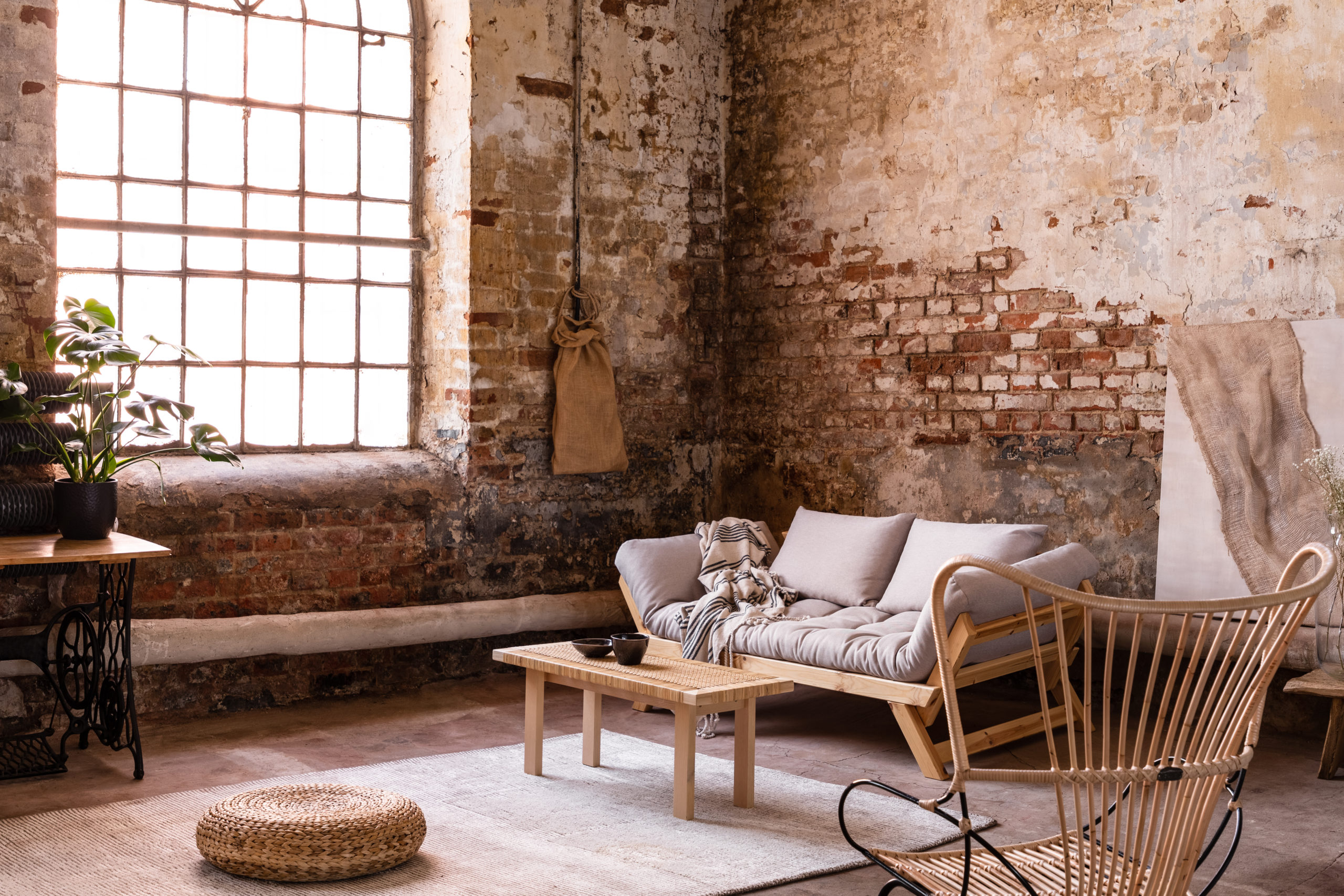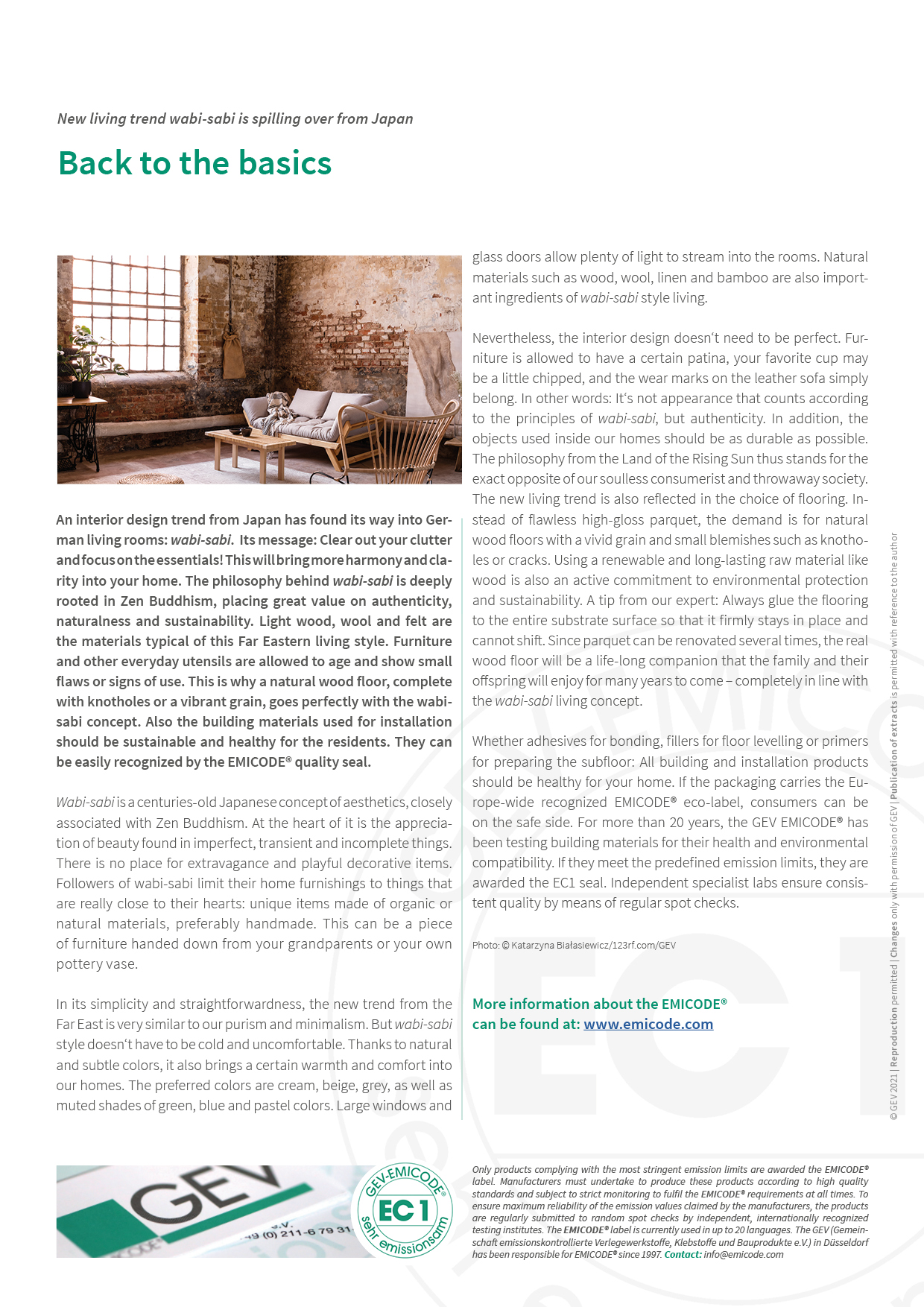Back to the basics
New living trend wabi-sabi is spilling over from Japan
An interior design trend from Japan has found its way into German living rooms: wabi-sabi. Its message: Clear out your clutter and focus on the essentials! This will bring more harmony and clarity into your home. The philosophy behind wabi-sabi is deeply rooted in Zen Buddhism, placing great value on authenticity, naturalness and sustainability. Light wood, wool and felt are the materials typical of this Far Eastern living style. Furniture and other everyday utensils are allowed to age and show small flaws or signs of use. This is why a natural wood floor, complete with knotholes or a vibrant grain, goes perfectly with the wabi-sabi concept. Also the building materials used for installation should be sustainable and healthy for the residents. They can be easily recognized by the EMICODE® quality seal.
Wabi-sabi is a centuries-old Japanese concept of aesthetics, closely associated with Zen Buddhism. At the heart of it is the appreciation of beauty found in imperfect, transient and incomplete things. There is no place for extravagance and playful decorative items. Followers of wabi-sabi limit their home furnishings to things that are really close to their hearts: unique items made of organic or natural materials, preferably handmade. This can be a piece of furniture handed down from your grandparents or your own pottery vase.
In its simplicity and straightforwardness, the new trend from the Far East is very similar to our purism and minimalism. But wabi-sabi style doesn’t have to be cold and uncomfortable. Thanks to natural and subtle colors, it also brings a certain warmth and comfort into our homes. The preferred colors are cream, beige, grey, as well as muted shades of green, blue and pastel colors. Large windows and glass doors allow plenty of light to stream into the rooms. Natural materials such as wood, wool, linen and bamboo are also important ingredients of wabi-sabi style living.
Nevertheless, the interior design doesn’t need to be perfect. Furniture is allowed to have a certain patina, your favorite cup may be a little chipped, and the wear marks on the leather sofa simply belong. In other words: It’s not appearance that counts according to the principles of wabi-sabi, but authenticity. In addition, the objects used inside our homes should be as durable as possible. The philosophy from the Land of the Rising Sun thus stands for the exact opposite of our soulless consumerist and throwaway society.
The new living trend is also reflected in the choice of flooring. Instead of flawless high-gloss parquet, the demand is for natural wood floors with a vivid grain and small blemishes such as knotholes or cracks. Using a renewable and long-lasting raw material like wood is also an active commitment to environmental protection and sustainability. A tip from our expert: Always glue the flooring to the entire substrate surface so that it firmly stays in place and cannot shift. Since parquet can be renovated several times, the real wood floor will be a life-long companion that the family and their offspring will enjoy for many years to come – completely in line with the wabi-sabi living concept.
Whether adhesives for bonding, fillers for floor levelling or primers for preparing the subfloor: All building and installation products should be healthy for your home. If the packaging carries the Europe-wide recognized EMICODE® eco-label, consumers can be on the safe side. For more than 20 years, the GEV EMICODE® has been testing building materials for their health and environmental compatibility. If they meet the predefined emission limits, they are awarded the EC1 seal. Independent specialist labs ensure consistent quality by means of regular spot checks.

Photo: © Katarzyna Białasiewicz/123rf.com/GEV
Natural materials such as wood, wool, linen and bamboo are most typical of wabi-sabi style living. Small flaws and signs of wear that witness everyday life in furniture and other objects are absolutely welcome. Light colors and earthy tones dominate in wabi-sabi rooms. That’s why a real wood floor complete with knotholes or a lively grain goes so well with this new design trend. When installing the floor covering, only use building materials that are not harmful for your health. These products carry the EMICODE® seal on the packaging.

Do You Have Questions?
If you have any questions on certain topics or want to contact us for another reason, please contact us by phone or email.
Phone: +49 211 / 67931-22
info@emicode.com
Share article on Social Media:
